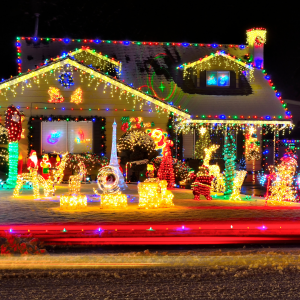
Incidents of house fires can rise by up to 50% over the festive season, often caused by faulty Christmas lights or overloaded sockets, and exacerbated by an increase in flammable materials in the home. A dry Christmas tree surrounded by gifts wrapped in paper is a lethal combination if a fire starts.
So what can you do to protect your home and your loved ones?
Poor quality or old lights are the biggest risk, so consider investing in new ones from a reputable supplier and check they comply with British safety standards. If you need to replace bulbs, make sure they’re the same type and rating, and don’t use lights with a frayed cable or exposed wire.
Modern LED lights are cool to the touch and pose less of a risk than the traditional filament type because they operate at low voltage and don’t require as much power, but all lights should always be unplugged overnight or when you leave your home unattended.
There’s a temptation to overload sockets and use multiple extension leads to plug in all the fairy lights and illuminated decorations, but overheating can cause fires so limit what you’re plugging in and make sure everything has the correctly rated fuse.
When choosing an imitation tree, buy from a reputable source, ensuring it meets safety standards and is fire retardant. Real trees are less likely to catch fire as long as they’re not allowed to dry out, but be careful when watering your tree if you’re using electric lights – use a residual current device (RCD) to protect yourself from the risk of electric shock.
Never leave young children and pets alone with a Christmas tree. Pets can easily knock things over, especially where there’s limited space, and children can be tempted to touch hot bulbs, climb to reach treats or play with decorations. Extra vigilance is required to prevent an accident – and always check smoke alarms are working and batteries are fresh.
If you’re putting up lights outside your home, check they’re specially designed for outdoor use and make sure they’re plugged into an indoor socket. Always use an RCD – water and electricity don’t mix, and outdoor lights run more risk of becoming damaged.
It’s worth revisiting your family’s fire escape plan so everyone knows what to do if a fire does break out – it’s especially important if you have guests staying who aren’t familiar with your home.
A few simple precautions will ensure you keep your home and your family safe this Christmas. Taking chances just isn’t worth the risk.
